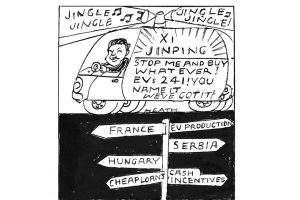Why does President Macron want European debt mutualization? Why has France become the spokesman for the ‘southern states’ on a European rescue package? Why did the French finance minister punch the air on learning that €540 billion (£440 billion) EU funding had been agreed on April 9?
There are three reasons. First because France’s soaring national debt, its floundering economy and its remarkably generous coronavirus rescue package are lining France up for an Italian style sovereign debt crisis.
Second, because ideologically Macron believes that Europe must integrate further or shrivel.
But thirdly, and most important of all — though Macron dare not say so publicly — because France is adamant that Germany must not be allowed to benefit from the epidemic’s devastation of the French and ‘southern states’ economies to forge ahead again ever more dominant on the European continent. The motivation is economic, for the moment. But increased economic dominance is always accompanied by increased political influence, no matter how reluctant Germany might be under Merkel to wield it.
France’s ruling elite tends to look further forward than most nations; but they also look further back too. Foresight isn’t necessary to know that the amenable Merkel will not be around for much longer. But the likelihood of the German economy pulling further ahead as a result of an unsynchronized return to growth in which the southern states and France remain locked in a stagnating debt-encumbered economic stasis has more worrying historical connotations.
At the end of World War One, France’s cry of ‘Germany will pay’ was less a plea for funding than it was a ploy to deny Berlin the resources to refuel and rebuild her economy. That zero-sum calculation is not lost on France today. By the end of the 1920s when it was clear that the German industrial engine could not be bridled France imaginatively came up with the Briand Plan for a ‘United States of Europe’ that would integrate the then 27 European economies and bind Germany to its neighbors and constrict its economic and political sovereignty. But in 1933 Hitler put paid to that.
Similarly, at the end of World War Two fear of a resurgent Germany was what motivated French pressure for Nato. France, even more than Nato’s first secretary general Lord Ismay, was attracted by its military ambition ‘to keep America in, the Russians out and Germany down’. But how could France hobble the German economic machine? The solution from Jean Monnet and France’s foreign minister Robert Schuman was the European integration treaties from Coal and Steel in 1951 to the Common Market in 1957, all intended to tie down a resurgent German economy.
When the Cold War ended in 1989, it was the wily French president François Mitterrand who understood that German reunification would be politically impossible to block. The price he extracted for his blessing from Chancellor Kohl was acquiescence in allowing the German Gulliver to be tied down further by ever more European strings in the form of the 1992 Maastricht treaty. The final lasso was to the powerful deutschmark; what Mitterrand referred to as Germany’s ‘nuclear weapon’. That was banished and replaced in 2002 with the euro and the European Central Bank. But the euro conversion rate was set too low for the deutschmark and too high for the French franc, according to the French. The German economy continued to rise and rise, just as its French neighbor faltered and stumbled with debt and unemployment.
What Macron used to call the ‘war’ on corona is winding down. As it does so, fear is rising of an asymmetric European economic exit from the pandemic. France’s heightened sense of history and 150 year bitter experience of living with its German neighbor teaches that it is time once more for new strings to hobble the unstoppable German economic machine.
***
Get three months of The Spectator for just $9.99 — plus a Spectator Parker pen
***
What better than European debt mutualization? The scheme — if acquiesced to by Berlin — will involve large financial transfers from the frugal ‘northern states’ to the profligate ‘southern states’ thereby hampering German financial advantage. More importantly, for the longer term, Macron will be hoping it will pin down Germany with more economic and political integration through tax harmonization and debt sharing in which the low tax, low debt, northern states balance the high tax, high debt, southern states; or to coin a phrase more of a ‘level playing field’.
Macron in traditional finger-waving mode warns that rejection of debt mutualization will be a gift to ‘populist’ parties in France and the southern states, thereby jeopardizing the European project. But be careful what you wish for Monsieur Macron. Little mention is made of the effects of arm-twisting the northern states taxpayers into bailing out France and the southern states in the short term and institutionally for the future. They too have ‘populist’ parties vehemently opposed to such measures.
Forcing Germany into debt mutualization by bypassing its national constitutional court and strong-arming it with the European Court of Justice — as is now threatened — could have a baleful outcome.
This article was originally published onThe Spectator’s UK website.


















